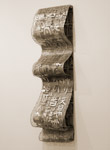This fall marks Blackbird’s fourteenth Levis Remembered, which calls attention to the work of Larry Levis and recognizes Sandra Lim, the winner of the eighteenth annual Levis Reading Prize.
Included in this year’s Reading Loop are the Levis poem “Elegy with a Thimbleful of Water in the Cage,” which originally appeared in the posthumous collection Elegy, and a spring 1996 recording at the Handley Library in Winchester, Virginia of Levis’s last public reading.
A selection of poems from The Wilderness represents Sandra Lim’s prizewinning book, and the poems are accompanied by a review of the book, audio and a transcript of a conversation with Lim, and audio of the Eighteenth Annual Levis Reading Prize event, which includes a reading by Lim, an introduction by David Wojahn, and an essay on Levis by Gregory Donovan.
Lim, clearly a philosophical heir of the eponymous poet, argues, in her own “Human Interest Story,” “maybe you can’t penetrate events with reportage.” Lim is fascinated by the way “a soul needs the presence / of desire. It says it’s worth dying to understand.” Ironic as her neo-romantic riffs seem (“The romantic grace we comprehend sits with ease in the real / world; it is almost nothing”), a small kernel of truth is still true, however paradoxically contingent.
The same could be said of the dark tunnel under the shed where Talvikki Ansel’s feral cats exist, at the mercy of their own “incendiary hearts,” a place no more tentative than the “land the child knows / where raspberries grow in the garden” and “fox grapes / [drop] to the pine needles.”
With the year winding down to winter again in the Northern Hemisphere and millions of people fleeing any number of far-flung theaters of civil strife and international conflict, it should come as no surprise that many poets and storytellers gathered here speak of dislocation and danger and diaspora.
In Fiction, Liza Wieland introduces us to Bakari Hawass, a young man on a fraught trajectory from Cairo to London to the hinterlands of Northern Virginia, where he traverses streets that seem “to turn back on one another . . . lost in the maze of cement and metal, the violence of nail guns and screaming generators and the bashing away at the past that Americans called renewal.”
Points of departure and arrival are not always easy to pin down. The wanderers Haya Alyan tracks in one poem “leave the wreckage for the birds / and live in skyscrapers.” Cast adrift in their own city, they tear “the atlas into psalms.” But new places always hold out new hope, and the journey itself ignites human passion and courage. So Kirun Kapur’s lovers celebrate the possibility of auspicious outcomes, after the “Beloved / caravan,” after a “sweet eon” and “wind erosion,” out beyond the hypothetical—“if we crush each other, // like a reef whose happy ending / is to be reborn as dunes.”
A number of the poets also offer work that explores fascinating territories of form and technique. A selection of poems by Gregory Kimbrell weaves fantastic imagery into the sturdy fabric of the well-told tale. Norbert, one of the denizens of this poet’s Kafkaesque dystopia, dreams of escape but wonders if “wherever he went in this world,” he’d simply find “the same wallpapered room and the same chimera / of woman and dog making its paranormal patrol.”
A trio of sonnets by Dean Rader and Simone Muench inject that traditional form with a unique polyphonic quality arising from the collaborative nature of their project, as well as textual samplings from Jorge Luis Borges, C.K. Williams, and Eavan Boland.
Greg Brownderville pushes voice work even further in “The Homemade Fireworks,” a long, sectioned poem whose first movement combines dialect-driven epistolary passages and an assemblage of biographical prose “shards” to create a portrait of his late grandfather, a frustrated artist whom “you could catch . . . doing / some beautiful country cubism” (read: “arranging and rearranging a stack of firewood to make it look just so”).
A different set of circumstances “strip back” the parental figures in Wynn Chapman’s memoir, “The War of the Ashes.” With wry humor Chapman braids her family’s narrative, marked by struggles with drug addiction and racism, together with strands of commentary about the historic and personal importance of the Civil War battlefield of Antietam. Chapman writes: “In a decent story . . . any daughter worth her salt . . . would immediately hang up and call the hospital to say, ‘Yes, she’s my mother. Yes, I’m responsible for her.’” But Chapman also warns, “This is not a decent story.”
With an inadvertently comical gesture toward Proust, Denise Calhoun’s “Swan’s Beak” spins the very ideas of decency and indecency, propriety and impropriety, into a raucous, Texas-style yarn. Amid the welter of pop-culture references cum product placements, propelled by the unapologetic quest-for-sex plot device, we could mistake this fast-talking narrator/heroine for Lolita wearing a ten-gallon hat.
Nini Berndt’s vaguely futuristic, vaguely dystopian story,“Considering the Girl, Hilda Dahlgren,” explores the fluid, fractal complexities of sexuality as Hilda struggles with the conundrum of failed monogamy and the troubling commodification of fertility.
The project of redefining the boundaries of contemporary notions of femininity concerns several poets in this issue. Sue D. Burton’s suggestive title “The Woman Who Is to Be Sawn in Half” foreshadows the incomplete lines in which that poem is composed, shaped to suggest that some part of them has been removed. A native courage shines out in the work of Jordan Rice, who offers an account of the “violent, / exact” journey that carried her into her own womanhood, how she had to “etch up another voice” from the collective silence she faced, and still felt she had to say “. . . I am sorry. Say again I had no choice. / I lost one self to this other.”
The struggling characters of Julialicia Case’s “Strangers in Houses” see themselves as the altruistic counterparts to the self-involved personalities on a Big Brother-like TV show. The television world seems more substantial, somehow, its pop-culture meeting place more “real.” This same blurring occurs in Melanie Faranello’s “Marionette” as a working mother tries to map the exotic romance of a novel she is reading onto the life she shares with her imaginative young son.
The characters drawn together in two short shorts by Erin McGraw confront circumstances no less exacting. The ostensibly thinner of two overweight sisters in “Fat,” pondering the forces that propel her overeating, explains “It isn’t hunger, exactly. Hunger is a friend, a presence I understand. This other thing, this compulsion, has no name.” (A reading by McGraw with Gregory Donovan also appears in Features.)
Such stories serve to remind us that disasters come in all shapes and sizes and that, in surviving them together, one way or another, we gradually become our truest selves. By turning the gaze of an immigrant worker upon the country club set he serves, Carrie Brown’s “Funeral” also teaches a timely lesson about compassion and the simple pride a person might take in knowing “how to help someone on with a coat, how to hold it at just the right height and angle so that a woman could slip her arms easily into the sleeves.”
Such definitive gestures, by their very simplicity and smallness, partake of the ephemeral—like a turn of phrase or a family recipe. No wonder, then, that “Another Country” by Silas House takes a page from James Joyce to depict how the eastern Kentucky people of his boyhood, the lives they lived, are on the verge of vanishing like the Dubliners who populate Joyce’s “The Dead.” When, in House’s story, Lily speaks, her uncle smiles “at the accent still living in her mouth. Most of the young people he knew talked like television.”
Brown and House limn characters trying to thread a passage through the injustices and overwhelming grief that greet the day with each morning news show. These are also old stomping grounds for Hal Crowther, who in “The Heaven of Animals” nudges us to reconsider relationships, the ethical boundaries of which we have long ignored: “The spiritual plane is too insubstantial, it seems to me, to allow closed doors and sealed passages.”
The problem of how to manage society’s cruelty also surfaces in Jacqueline Goldfinger’s Slip/Shot, a play in which a white security guard accidently kills a young black man. Written in 2011, the play predates more recent terrifying events and cannot avoid being seen in their light. Deep sadness is its currency.
In Nonfiction, Matthew Gavin Frank’s essay “Making Weight of the Okie Sirloin” investigates family and heritage through the media of wrestling and bologna—“The singlet, the headgear, the kneepads. How the things meant to protect us are the things, here, that pin us, pin us down.”
David Trinidad probes a rather different heritage as he tries to tease out the origins of Sylvia Plath’s poem “Lesbos” and, in the process, meditate on the conundrum of the confluence of art and autobiography. His work also surfaces in John Bresland’s video, Peyton Place: A Haiku Soap Opera, which incorporates text from Trinidad’s 2013 book of the same name. Bresland’s work sets Trinidad’s haiku against actual footage from the 1960s prime-time soap opera Peyton Place and, as Gregory Donovan writes in his editor’s commentary, “examines the looking generated not only by the camera’s eye, but also by our own changed vision of a set of cultural moments and icons that time and history have inescapably altered.”
In Features, the voice takes center stage in readings by Stephen Dunn, Barbara Hurd, Jennifer Grotz and Charles Wright and demonstrates that an intimacy created by the sound of a writer’s breath can serve as a counteragent to some of the noise that assaults us when we step out the door.
The work of fiber artist Kiyomi Iwata invites a different kind of intimacy, one that requires patient attention. Represented here are pieces and a process video from her recent show at Richmond’s Visual Arts Center as well as an essay by Howard Risatti. Of Iwata’s work, Risatti writes “her insistence upon the primacy of the singular, handmade object with its many layers of meaning . . . offers an alternative to a world overflowing with anonymously made objects that have never been touched by a human hand.”
A very different energy informs Nina Paley’s animation This Land Is Mine, excerpted from Seder-Masochism, her longer work-in-progress. This piece bombards a viewer with an apocalyptic violence that is no less frightening because of the bright colors and highly stylized animation.
Reviews of recent work by Elizabeth Seydel Morgan, Laura Van Prooyen, and Sylvia Wilkinson and a Time Capsule of images, text, and film from 1914 round out the issue.
![]()
Return to top menus | Browse issue
















